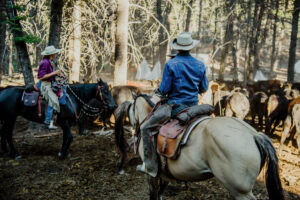How is Alderspring Beef packaged?
All beef is hand-cut and hand-packaged. Because of the artisanal nature of our packaging, you may find some variation.
Cuts are vacuum packaged into single serving or meal-sized packages. Each steak and each pound of ground beef are individually wrapped. Roasts are packaged whole and range from 2-12 pounds. Other cuts like hearts and tongues are sold by the piece.
All cuts are vacuum-packed into BPA and BPS-free cryovak packaging. The packaging is transparent for easy identification in your freezer. Meat packed in vacuum pack will never freezer burn, unless the vacuum pack is punctured or compromised. We caution our buyers to handle their vacuum pack meat carefully to avoid putting holes in the packaging.

Do you irradiate the meat?
Never.
What is dry aging vs wet aging and which do you use?
Aging beef is an important process that makes even the finest of meats more tender and flavorful. We have honed our aging process over the years to produce the most flavorful and tender beef without the development of off flavors or mycotoxins. We use dry-aging, a process that is more expensive and less common than wet-aging.
Dry-aging is a process where prime cuts are exposed to temperature/moisture/light-controlled coolers where an outer crust will form. This crust is carefully removed, leaving meat that displays a distinctive flavor and tenderness that is only found when dry-aged.
Our dry-aging process is different than most dry-aging processes out there because we use a much shorter dry age. Many producers use a 21-30 day dry age process, which we’ve found can result in the development of histamines that a small percentage of people have an adverse reaction to. We’ve dramatically shortened our dry-age process as a result and have found that we still get the same great flavor results without the histamine development.
Wet-aging occurs when meat is placed inside of vacuum-sealed bags, preventing exposure to air and moisture from evaporating. Enzymes break down the meat‚ as complex proteins from the inside out. We have found that wet aging does not produce a desirable product for our grass fed beef.
Does Alderspring use mechanical tenderization?
No. This is more common than most people realize and involves stabbing the meat with narrow razors to tenderize it before packaging. We believe this introduces pathogens from the outside of the meat to the inside, and should not be needed if beef is produced correctly. Our growing and processing protocols are what make Alderspring beef tender, not mechanical tenderizing.
Are there any other ingredients mixed into the beef?
No. Our beef is just beef, unless you’re buying one of our artisanal products like jerky or sausages. For these, a complete and transparent ingredient list is included in the description. As a family with multiple food allergies, we take your right to know exactly what is in your beef very seriously.
Is your beef inspected?
A full time USDA inspector monitors the processing of our beef from start to finish. Unlike large plants where an inspector may be responsible for looking at many beeves per hour as the carcasses roar down an assembly line, in our small family-owned plant the inspector has plenty of time to inspect every beef and monitor every aspect of the cutting and packaging of it.
Who processes Alderspring Beef?
We are proud to have Stillwater Meats, a small family-owned packer, work with us on processing our beef safely, humanely, and with the highest standards of quality. Stillwater Meats is a USDA-inspected facility, with an inspector examining every animal individually. The father-son team of Dewey and Jason have won many awards for their artisanal beef, and bring an exceptional level of care in processing what we produce.
Are the cattle harvested humanely?
This is important to us. We are ethically bound to treat the animals in our care with the highest standards of stewardship and care. We husband these animals throughout their life, and are adamant that the harvest of our beef be done with no stress and no pain. The animals are handled quietly and dispatched instantly.
Does freezing beef affect its quality?
Not the way we do it. Freezing can impact flavor when done too slowly. We’ve come up with a flash-freezing method that maintains beef quality. We believe frozen beef is the safest, freshest, and best way to bring you our beef.
Approximately how long ago was my beef processed?
We generally sell our beef within several weeks of it being processed.

